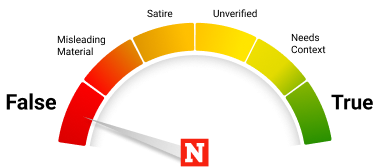The 2024 solar eclipse was viewed by millions of Americans on Monday as the moon's path crossed the sun, blocking the view of it completely across multiple U.S. states.
The path of totality extended across several states including Texas, Arkansas, Missouri, Kentucky, Ohio, New York, Pennsylvania, Vermont and Maine before heading into Canada and over the North Atlantic.
Those viewing the eclipse were warned to protect their eyes using specially designed glasses. However, one video widely shared on TikTok appeared to show a child who had not heeded that advice.

The Claim
Multiple TikToks posted on April 8, 2024, included a video purporting to show a child going blind from watching the eclipse.
One TikTok by user freddygonzalez7, viewed 1.6 million times, was titled "Kid goes blind after staring at solar eclipse without solar eclipse glasses."
Another TikTok posted by user superluckkk, on April 8, 2024, viewed 2 million times, included the same clip with the title "Solar Eclipse makes kid go blind."
The video depicts a child acting distressed and saying that they "can't see anything." The child appears to cry as their parents intervene.
The Facts
Looking directly into the sun during a solar eclipse can cause retinal damage. Ultraviolet radiation can cause sunburn of the cornea, known as solar keratitis, possibly leading to solar retinopathy, when a hole is burned into the retina (the light-sensitive layer at the back of the eye).
This video, however, does not show a child going "blind" after looking at the eclipse. It's from a viral video "skit" recorded around the time of the last solar eclipse visible in the U.S, which occurred on August 21, 2017.
The video was uploaded to the YouTube channel FV FAMILY in September 2018 with the title "2017 SOLAR ECLIPSE! DO NOT TAKE OFF THE GLASSES! FUNnel V SKIT." Other uploads show it has been online since at least 2017.
Apart from the word "SKIT," it's not otherwise indicated that the content is fake or performed. The child's performance is uncomfortable, concluding with the sound of emergency service sirens and the message "SORRY FOR THE ENDING THE VLOG LIKE THIS... WE'LL LET KNOW WHAT HAPPENS :("
However, FV FAMILY confirmed in a follow-up video that the child, referred to as "Mike", was not blind.
"He's not blind, it was supposed to be like a two, three-part video joke. Now I realize it was tasteless," said Vincent Carter, the video's producer who also appeared in the 2017 film.
He later said "My mentality was going to be like 'Is this for real? I don't know.' And then get you guys hooked to want to keep watching. The plan wasn't to make you guys upset."
The same channel uploaded another video on April 9, 2024, that referenced the original clip, titled "2024 Solar Eclipse Healed my Blind Son..."
The next solar eclipse to pass through multiple states will be on August 23, 2044, although the path of totality will be much smaller than Monday's event. Only Montana, North Dakota and a small part of South Dakota will be within the path.
Americans will have a chance to witness another total solar eclipse only one year after the moon blocks the sun in 2044, on August 12, 2045.
This path will be much longer, and viewers in California, Nevada, Utah, Colorado, Kansas, Oklahoma, Texas, Arkansas, Louisiana, Mississippi, Alabama, Georgia and Florida will get a chance to observe the event.
The Ruling

False.
The video shared on TikTok is not authentic. It was produced in 2017 around the time of the last solar eclipse. The video's creator said in a follow-up film that the child in the video was not blinded.
FACT CHECK BY Newsweek's Fact Check team
Uncommon Knowledge
Newsweek is committed to challenging conventional wisdom and finding connections in the search for common ground.
Newsweek is committed to challenging conventional wisdom and finding connections in the search for common ground.
About the writer
To read how Newsweek uses AI as a newsroom tool, Click here.






